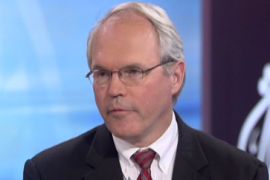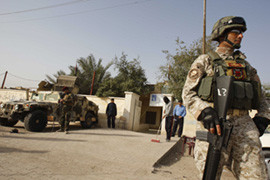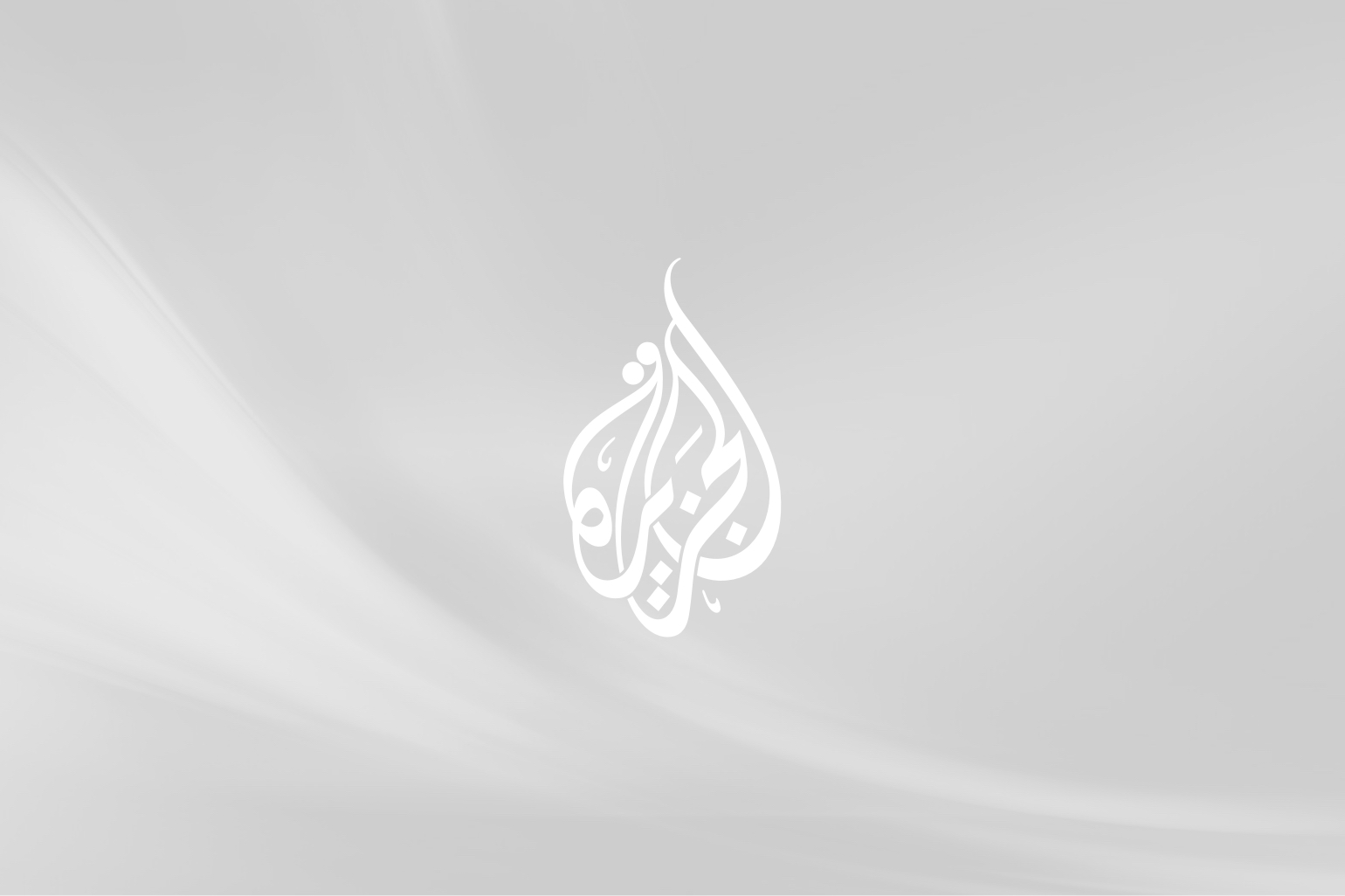Interview: Future US role in Iraq
US diplomat says Washington will work with any democratically-elected premier.

 |
| Despite a recent spike in attacks in Iraq, the US military says it will proceed with its withdrawal schedule and have all combat troops out of the country by the end of 2011 [GALLO/GETTY] |
A spate of attacks and bombings in Iraq in recent days has shattered relative calm in the country, leaving more than 100 people dead in Baghdad alone.
The spike in violence comes about a month after more than 11 million Iraqis went to the polls for nationwide elections that the UN, US and others have called free and fair.
But with no evident winner emerging from the vote, Iraqi politicians are caught up in wrangling and negotiations to build a new coalition government.
The US, meanwhile, says that its plans to end all combat operations, and halve the number of troops deployed in Iraq by the end of August, are going forward.
But with the recent bombings, and no new government yet on the horizon, the future US involvement in Iraq is being called into question.
To bring clarity to the situation, Al Jazeera sat down to talk with Christopher Hill, the US ambassador to Iraq, during a short visit to Qatar.
As combat operations are due to end on August 31, 2010 and troop numbers are to be reduced, how would you define your role as US ambassador to Iraq?
I’m representing US interests there and, in particular, I’m trying to be helpful to the Iraqis as they go through their transitions. Secondly, I am trying to make sure that in so far as the Iraqis want to join us in a long-term relationship that they know that we are prepared to work toward a long-term relationship.
|
Hill said Iraqi officials have tough negotiations ahead in efforts to form a new government |
So I spend a lot of time trying to demonstrate that there is more to the United States there than just military, that we want to have relations across the board, whether it’s scientific, educational, economic or cultural.
The other day I met with an Iraqi basketball team, I met with an Iraqi baseball team, I’ve gone to the Iraqi university, and I’ve done web chats with the Iraqi university.
We’re trying our best to have a normal relationship with the Iraqi people and make sure that if they want this long-term relationship, we’re ready for it.
You said you are representing US interests – what specifically are US interests?
Our interest is in a secure, stable and peaceful Iraq. We believe a secure, stable, peaceful, democratic Iraq will be a very important element in the Middle East.
We are not asking Iraqis to do more than deal with their own country; we’re not asking them to be a model for anyone else, but we do believe that the entire region will benefit from a democratic and peaceful Iraq, rather than a dictatorial and aggressive Iraq, which is what we had in the past and what has led to so much instability in the region.
But coming back to what you were saying earlier, the future role of the US in Iraq, then, is up to the Iraqi people?
| FROM THE Blogs | ||
|
Yes, we will work together – you cannot force a relationship. We are prepared to do some things, we are prepared in particular to implement our part of the strategic framework agreement, which we reached with Iraq at the end of the Bush administration.
We are prepared to see that strategic framework agreement is implemented. It involves a number of areas, including diplomatic co-operation, which is why we’re trying to help the Iraqis through some of their diplomatic challenges, including helping them get out of Chapter VII (of the UN charter). It also involves economic activities, and other things.
So we have a complete blueprint of what that relationship should look like in the future and I’m going to see if we can get that thing implemented.
Is that part of why you came to Doha?
No. Why I’m here in Doha is to come to Al Jazeera, which I think has an important role to play in affecting public perceptions in the region, and what I want to do is kind of report on how things are going on in Iraq.
Doha is a media centre, and this was for me an opportunity to come here, to see this, and to explain what we’re trying to do.
So then it’s fair to say that US policy or attitude toward Al Jazeera has notably shifted from the days of former US secretary of defence Donald Rumsfeld and the Bush administration?
I’m certainly not going to start speaking for Rumsfeld. I never have, and I don’t think I ever will.
But I’m interested in talking to fair-minded, influential journalists, and those are well represented here at Al Jazeera.
We talked about the future role of the US, basically trying to build a long-term relationship with Iraq on cultural, scientific, economic and other grounds. What about Iraq building these same ties with Iran?
We support Iraq reconciling with all its neighbours, we support Iraq having a positive relationship with Iran. But Iran needs to approach Iraq with one thing in mind: to respect Iraq’s sovereignty.
We think other countries need to do the same, and again, I think it’s in the interest of all the countries in the region that there is a stable, strong, democratic and peaceful Iraq.
I think a weak Iraq is not a stable element for the region. I believe an undemocratic Iraq is also not a peaceful or stable element. So it should be all of those things I just described: stable, strong, peaceful, and democratic.
In regards to a new Iraqi government, is there any candidate the US wouldn’t work with? For example, the Sadr bloc, which is loyal to Moqtada al-Sadr, the anti-US Shia leader, has seemed to favour Jaffar al-Sadr as the next prime minister.
We are prepared to work with a candidate that is democratically chosen by the Iraqi people. I’m not saying every single person is someone we would want to see, but what I am telling you is we will work with the person the Iraqi people choose.
It’s for them to choose a candidate by democratic means; it’s not for us to choose a candidate for them.
 |
| Blast walls and numerous checkpoints hinder a normal daily life [REUTERS] |
Regarding reconstruction, from my experience there during the elections, electricity is still very inconsistent in Baghdad, and the fact is there are blast walls everywhere, which hinder daily life.
With the US drawing down in August, and due for a complete pullout by the end of 2011, where does that leave reconstruction efforts?
We are trying to do as much as we can on projects, but at some point the Iraqis need to take them up, and we’re certainly working with Iraqis on which projects they will take up and which ones we will continue.
So we’re working very closely with them.
But in practical terms, what is the US commitment to Iraq’s reconstruction?
We have considerable amounts of assistance in the US aid budget. I think you’ll see more assistance being transferred from our military to our civilian authorities, that is, through the agency for international development.
This assistance will continue as long as it is deemed to be mutually beneficial.
I think you’re going to see fewer brick-and-mortar (projects), and you’re going to see more capacity-building projects.
But I think this will also coincide at a time when the Iraqi capabilities are also increasing, and Iraq is able to take on more of the burden of reconstruction.
